Where locals go: Tianjin
 |
|
Jiefang Road is like an open-air museum for old architecture, like the Astor Hotel. Provided to China Daily |
Jiefang Road
Called by some as the Oriental Wall Street, the Jiefang Road of Tianjin used to be the location where Chinese and international financial institutions congregated in the late 19th and early 20th century.
HSBC, Standard Chartered, Citibank, Russo-Asiatic and many others used to be located here. Although the companies are no longer operational at the site, their original buildings are preserved, making the road an open museum of architecture.
On 111 North Jiefang Road stands Tianjin Post Museum, which was originally the Tianjin Customs Post Office of the Qing Dynasty, built in 1878, where the first stamp of China was released.
The first asphalt road in Tianjin, Jiefang Road's construction started in 1863. The different names that the road or part of it was called, reflect the upheavals in China's modern history.
Because the road cut through the British, German and French concessions, parts of the road used to be called Victoria Road, Wilhelmstrasse and Avenue de Grand France.
In 1943, the road's name was changed to Road No 7 of Xingya (Prosperous Asia) Second Area during the Japanese occupation. After the Japanese surrendered, the Kuomintang government named the road Zhongzheng Road, after the name of Jiang Zhongzheng (who is better known as Chiang Kai-shek). The road was finally named the Jiefang (Liberation) Road in 1949, and remains up till this day.
Tianjin is resolved to regain its glorious past and is building a new financial area, with Jiefang Road as its axis. But for now, the road is still quiet, which makes a stroll along it particularly enjoyable.




















